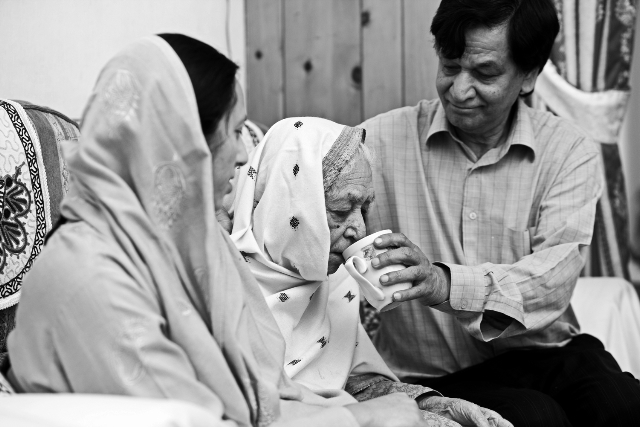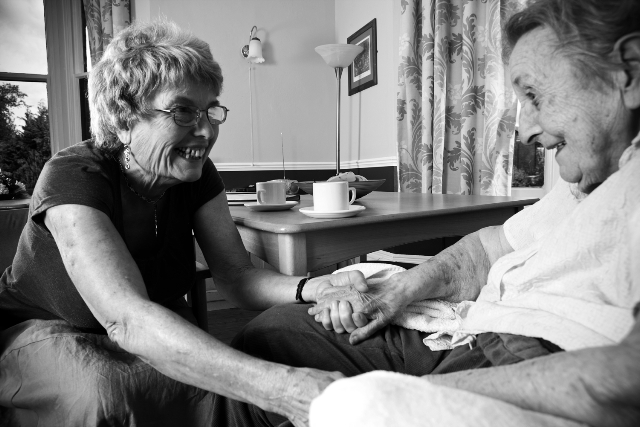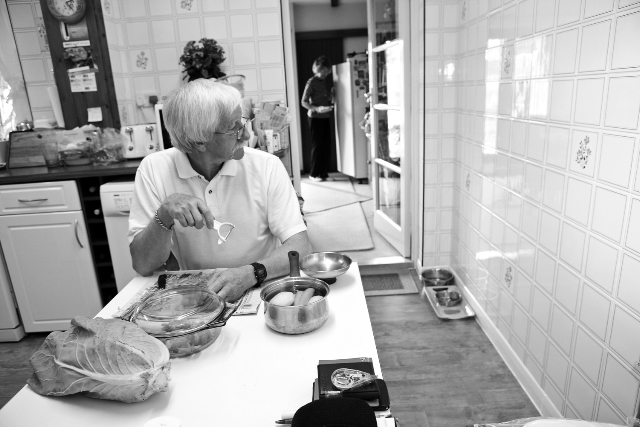See the Guardian’s new social enterprise network for my piece on social enterprise as a magic wand: The challenge facing social enterprise, warned Peter Holbrook, chief executive of umbrella group the Social Enterprise Coalition, before the election, “is to be vigilant to ensure that the discourse on social enterprise is not distorted by the next government’s ambitions and policies around it.”
Category Archives: Uncategorized
How to get the best from your board
From my piece on the Guardian’s new voluntary sector network: With the voluntary sector facing a potential funding drop of £4.5bn in the next year, the contribution that trustees make to an organisation’s performance has never been more important.
Nothing can bring back Mel, but her experience is making a difference

By Ian Leech
Following a summer of ‘common ailments’, in the August of 2007 my eldest daughter Melissa was diagnosed with non-Hodgkin’s lymphoma.
It was at that moment our relationship with the NHS began. Melissa was a student at Aston in Birmingham, she was living university life to the full and if there is such a place as heaven, it seemed Melissa was already there.
However, the day after her 20th birthday her world, and ours, changed in an instant, with the news that she had lymphatic cancer.
Like the staff that cared for Mel, we were thrust into the role of carers, the difference was, they were professionals, and they’d had training. There isn’t anything in life that can prepare you for the role we suddenly found ourselves plunged into, no parenting manual or course to attend, you rely on pure instinct, love, and the hope that the decisions you are making are the right ones.
We watched and waited, twenty four hours a day, seven days a week for nine months. We watched for any sudden rise in Mel’s temperature, a signal that she may have contracted an infection and the knowledge that a trip to A&E would be imminent. We waited for consultants to arrive with the latest news and would try to remain calm if it wasn’t what we wanted to hear. We waited for calls for results following x rays and scans. We watched the hard work put in by nurses and other staff and grew to appreciate the role of everyone, from the consultants to healthcare assistants and even the lady who came round with the tea trolley.
Mel’s care during her time in hospital was very good, but there was room for improvement, minor tweaks rather than wholesale changes.
Having patient access to the internet is something all hospitals should have. It kept Mel in touch with her friends and family and also allowed her to get support and relevant up to date information from the Lymphoma Association’s website.
Late teens to mid twenties is a difficult age range to nurse, Melissa wasn’t a child, but there was a loss of independence and an age regression that certainly brought about a strong reliance on us as parents. She needed us and fortunately, at both Burton and Nottingham hospitals we were allowed to stay with her for as long as she wanted. Another hospital we attended wasn’t so accommodating.
Our issues with Mel’s care mainly focused around communication and this lack of consistency between hospitals.
Mel was nervous of needles and I used to sit with her and let my hand be squeezed when blood was taken or canulas attached. However after being transferred to another local hospital for her chemotherapy, we found this practice wasn’t allowed and she had to deal with this trauma alone. It was at this same hospital where they refused to use her Hickman line (intravenous catheter) because the nurse wasn’t trained, this was after she’d been told needles would be a thing of the past after having the line inserted.
No news meant bad news. If a scan or test had worked, we seemed to be told immediately, whereas we always had to wait for bad news. This meant unnecessary worry. A simple phone call to explain that something hadn’t gone to plan but they were working on other options, would have alleviated the stress of not knowing.
On the whole though, Mel’s treatment and level of care in hospital was very good and this was helped by the wonderful rapport she built with her consultants at Nottingham and Burton. They knew Mel was a football fan and they used that as a common interest to build a patient/doctor confidence. It made Melissa feel special and that she was being treated as a person, not just a patient with a disease.
Our experience has led to me going into hospitals to talk to staff about our nine month insight into hospital life. The feedback from health professionals has been excellent. I also give the same service to bereavement groups. Nothing I can do will ever bring Melissa back, but it’s nice to know that even though she’s no longer with us, her experience is being used to make a difference to people’s lives.
To find out more, visit the website Mad4Mel.
For information about lymphoma visit the Lymphoma Association website.
What cash-strapped cities can learn from Birmingham’s clean up
My piece in Guardian Public: Litter-strewn public spaces, pavements speckled with chewing gum and rowdy street drinkers. For any town centre manager, these city centre hallmarks are familiar problems.
When ‘thank you’ are the best words you can hear

Jo Sharp, 38, from Croydon, south London, is a parent support advisor with the charity School-Home Support (SHS). Jo works in an infant school, a junior and a secondary, all in south Croydon. Here she explains why her role is vital and describes its challenges its rewards.
I became a parent support advisor because…I’d provided support to my neighbours, it became apparent to me that there were many families and children who weren’t receiving the help they were entitled to. I enjoy the range and diversity of the work as well as the fact that I reach out to families directly and provide a holistic service to them.
My aim is…to develop a supportive environment for the families and children. For me, the relationship is often the work and I feel it is a great privilege to be allowed into people’s lives and share in their experiences.
The first child I helped support was…suffering from extreme anxiety over going to school and his attendance was below 50% as a result.
Teachers knew there was an issue with this child because…he’d attend maybe two or three days a week and leave early. He appeared withdrawn and lacked confidence.
The first thing I did was…meet his family to look at possible reasons for his anxiety. His parents were extremely worried and had tried to support him in the best way they could. Despite this, the child would often lock himself away in his room rather than face questions about school. His parents and I agreed that I would meet with him in school rather than at home.
The reaction I got from him was… we spent a long time discussing his experiences at school and his feelings regarding his own self esteem and confidence. Because he had started school in year eight, he’d missed out on the bonding with his peers in year seven. This had a big impact on how he felt he fitted in, and he’d started to put himself second to everyone else in his quest to ‘be liked’. He’d also started to develop much faster than some of his peers so felt he stood out too much. All this had left him feeling increasingly anxious about coming to school until he just couldn’t face anymore. Over the weeks we looked at ways of improving his assertiveness and developing a positive image of himself. He was allowed a reduced timetable at school, gradually building up to full days.
I knew we’d started to get somewhere when…he became more active at the weekends and started playing football and socialising more with others. Prior to this he found it difficult to leave the safety of his house for prolonged periods.
The hardest thing was…keeping up the momentum. It would only take a slight knock for him to feel anxious, however by maintaining close contact with him and his family and being there to support him when he was feeling anxious, the anxiety became less severe.
The most rewarding thing was…to find that he’d not missed one day of school and that he’d really turned his life around! His attendance is 100% and he participates in activities outside of school, his teachers have said he’s much more positive in school and appears to enjoy his time there. His family has also expressed their delight at having their son back!
To do this job you need to be…patient! Change doesn’t happen overnight. The rewards are fantastic when you see first hand how the support you have played a part in has had positive effects on families and young people. I believe that you need to be able to connect emotionally with the families, having empathy and compassion whilst also being able to look at the bigger picture and think logically about what support can be provided. A good understanding of local services and outside agencies is key.
The biggest problem facing the sort of young children I help support is…a lack of understanding. Sometimes it is very practical support that is required and at other times it is more emotional, but either way I feel that young people often feel misunderstood because we as adults actually lack a perspective on their world.
If I could have a word in education secretary Michael Gove’s ear I’d…ask that more focus be placed on supporting families and children in and outside of school. It works!
The best thing a child I’ve helped support has said to me is…thank you!
Like animals? Fancy working in an abattoir?
Enter, if you will, the parallel universe of the traditional local authority careers advisor, where nothing bears much relation to a young person’s dreams or talents.
In this spooky alternative reality, I have followed the 1985 suggestion of my school-based careers advisor, ditched my “unrealistic” dream of becoming a journalist and am now a teacher.
Mr Saba Salman, meanwhile, didn’t become a documentary filmmaker but stuck to the advice of his careers advisor and became – ta daa! – a careers advisor! And among my friends I count an abattoir worker (she wanted to be a vet but the computer said ‘no’), a prison officer (she’s actually a showbiz journalist) and a lawyer (she said she was shy but liked languages and writing – she’s now a European social policy consultant).
This parallel universe is, of course, based on events some two decades ago, but it’s incredible that so many people still recall the terrible advice they had – and it’s coloured their image of the entire profession.
My nice but singularly insipid adviser informed me that journalism was “a bit difficult” to get into and refused to organise work experience at my local paper on the grounds that I’d be turned away from such a competitive profession. Credit to her that instead of finishing me off completely by yelling “HEY LOSER! YOU’RE ONLY 13 AND YOU’VE YOUR WHOLE LIFE AHEAD OF YOU BUT – BEHOLD – I CRAP ON YOUR DREAMS!”, she comforted me with the affirmation that I was “a good all rounder” who would be suited to teaching.
Now I take my hat off to teachers; I know some inspiring ones working in challenging schools, and it was my brilliant English teacher who supported my interest in writing. But I had a clear idea of what I wanted to do – and teaching wasn’t it.
Mr Saba Salman had a similar experience. After explaining that he liked reading, writing and photography, he was inexplicably told to work in careers advice. Meanwhile my pet-friendly friend punched her likes (people, animals) into a computer programme during her advice session and was told to work in a slaughter house…and so the stories go on.
Was there a massive yet unreported national shortage of teachers, careers advisors, prison officers and abattoir staff in the mid-80s? Were well-meaning careers advisors attempting to rebalance the economy? Or was the service just plain rubbish?
I ignored the patronsing old boot who misadvised me, concluding that it was she who was difficult, not my chosen career. But how many of my peers took the advice along with an unsuitable career path after someone rode roughshod over their dreams?
The careers advice has changed since I was at school. Known as Connexions, what it does well is to target the young and vulnerable with information on careers and personal issues. But its shortfalls were documented in a report from the CfBT Educational Trust last year and Connexions offices face massive job losses as a result of public spending cuts.
So it was with interest that I noted the recent news that the government is to take careers advice responsibility away from councils and launch its first all-age careers service building on Next Step and Connexions. The all-age service launches in 2012 and aims to offer seamless and universal careers advice.
Connexions will disappear. Councils will still advise vulnerable young people, but with what funding and under what auspices is unknown- and that might impact on the disadvantaged.
However, the Department of Innovation, Business and Skills acknowledges that careers guidance is at the heart of increasing social mobility. The pledge that schools will be under a legal duty to secure independent, impartial careers guidance for students is interesting, as is the option for a kite mark for the best career guidance and a register of providers meeting the highest standards.
The new service should include a strong online presence as young people are increasingly looking to the internet for advice. The online youth support charity YouthNet, for example, runs a rich, web-based careers advice resource The Site with a valuable ‘ask the experts’ option.
And the service could help older workers. Research published today by the Employers Forum on Age (EFA) and Cranfield School of Management describes the stagnation in the careers of many over 50s. With the fixed retirement age being abolished in 2011, and the state pension age rising for both men and women to 66 in 2020, many people might look for a career change later in their life.
Of course unless the job market picks up, the recipients of this world-class careers advice won’t actually have anywhere to actually launch their careers – but let’s not quibble about that for now.
And finally, Mrs West Sussex County Council Careers Advisor c1985, it is to you I dedicate this blogpost (a form of journalism no less). Because it is with no thanks to you that I am here today. Cheers.
Sandi – the networking nan

By Sandi Hughes
Sandi Hughes, 67, describes herself as “a nan with a kick” who not only DJs in her hometown of Liverpool, but is on a mission to get more older people online. Here she describes being what she calls a “digi-elder”:
I’m a digi-elder, I use the Internet and am open to new technology – but it doesn’t always go right, like the time I got ‘lost’ on YouTube.
I was in a friend’s kitchen, there were six of us chatting, and my friend told me to get on his computer and find some tunes for us to listen to. I opened YouTube and typed in ‘Missy Elliott’ and everyone made comments on how great the bass sounded and wanted more. When the song finished, I highlighted her next song, and then the next one, and on the next one she sounded a bit different. I clicked on the next one – and realised it wasn’t Missy Elliot singing the song, so I clicked on the next one and each time I clicked on a Missy Elliott song these different girls were singing and the words were getting changed and the visuals were getting more and more raunchy, and my friend said “why are you playing that type of music?” and “what are you listening to – GET IT OFF!” he shouted.
The more I tried to get another Missy Elliott song, the more unclothed the girls were getting and the melody and ambience sounded more like an adult film. My friend shouts “I DON’T WANT THAT FILTH ON MY COMPUTER”, and leans over and flicks the power switch off, creating a blank screen and bringing silence into the kitchen.
As tech-friendly as I think I am, why didn’t I think of doing that?
I first bought myself a Mac when I was 62, to invest in the skills I had learned while using analogue equipment for a video production course. I concentrated on iMovie and iPhoto software which were simple to follow and easy to use. I have yet to play games on my Mac though – my grandson who is 20 has given me his old Nintendo games console…it’s still in my cupboard!
I was DJing for a project called Giants in the Hood which a group of artists from Helsinki held during Liverpool’s 2010 Biennial. I loved it, and had so much fun mixing vinyl and CDs and choosing tunes that kept people dancing for almost two hours. I was aware of how surprised people were at me being able to do this at 67.
Using technology, remembering which button to press can be a problem but regular practice helps. You could say that our memories have always been in analogue, but now our memories have to become digital, so we can remember everything more accurately all the time, because of the way it is fed and kept into computers.
Elders need tailor-made courses on how to get involved and connected to the Internet, support to improve their skills and protection against things like scams, identity theft and fraud.
So many things are digital now; the gas man gets me writing my name with a piece of metal onto a metal box with a plastic screen on it. “It’s called a digital signature,” he tells me. There’s mobile phones, laptops, games, video and stills cameras, Facebook, digital television, online banking – you can pay bills on the internet now, without the need to handle money – you can do your shopping in most places on the net now.
We need to be able to stay connected to our younger generation, with social networking you can keep in touch with your kids, grandkids, mates on Facebook, Twitter, Skype.
With the Internet you can access and share the sense of wonder when you just push a button and enter a place instantly that could be the other side of the world. A lot of us have a passionate desire to always want to know more, and technology and the Internet does this for me. It fulfills my need to push my creative boundaries, offers easy access to information, education, creativity and is a platform for games. It’s hard to loose stuff in a computer.
N u learn nu kwik n e z spellings of sertan wrds specialy in mob fonz n fcbk.
Politicians should pay attention to digital inclusion issues among elders because of the potential that technology and the Internet has to improve life. They could make a real commitment to listening to, valuing and investing in the elders, socially disadvantaged families, and physically challenged people who can’t access it.
There’s a big gulf between those who are ready and have access to computers and the Internet, and those who do not. There are confident users of it and those who are not – but the gap will close when my generation dies, because newer generations will be born into it. Reminds me a bit of the confusion when money changed over to decimal currency in the sixties!
Internet access should be a human right. I’d like to see free broadband for pensioners, or at least a subsidised package. It’s the future – but not as we all know it, so you need to get to know it!
Who cares for older carers?
When Christine’s father died, her mother, Margaret moved in with her. Forced into early retirement and the role of full-time carer, Christine struggled with finances and she has only recently secured four hours support a week. Older carers like Christine, whose story is featured below, contribute an estimated £15bn in unpaid care a year, yet their stories and support needs remain largely invisible.
The Invisible but Invaluable campaign from the charity Age UK demands that the government recognise and prioritise the needs of older carers, and ensure they receive the financial, practical and emotional help they need. Michelle Mitchell, Age UK charity director, says: “Many people become carers in later life almost without realising it. At a time when their own health may be deteriorating, they find they are having to prioritise the needs of someone else. Then they must navigate their way around the ‘system’ to get the support and help that they need.”
Age UK argues, amongst other issues, that simplifying the application for Carer’s Allowance and other benefits and encouraging carers to register as carers with their GPs to receive regular health checks could improve the lives of an often-overlooked swathe of the population.
Three of the images that sheds some much-needed light on the lives of older carers are below (all photos by are by photographer Sam Mellish). For more information check the Age UK website. You can see the Invisible but Invaluable photography exhibition at the crypt of St-Martin-in-the-Fields church in Trafalgar Square in London, until 21 November.
“My mother brought me into the world and comforted me. Now she needs me.”
 Mohammed Baig, 64, and Ruby, his wife, care for Mr Baig’s mother: “I came from Pakistan in 1961. When my mother wanted to retire, I asked her to come from Pakistan and stay with me and the Home Office agreed. I am her only son. In our culture, sons are responsible for the parent. My mother is partly blind and can hardly walk. She needs 24-hour care. She once switched on the gas cooker and left it on. She can’t be left alone at all. Sometimes at night she removes her incontinence pad and we have to change the bed clothes and her night clothes. In the last five years my mother has started to get dementia. Social services said they would put her into a nursing home, but I don’t want her to die somewhere else. She needs people who are close to her to talk to. My mother brought me into the world and comforted me. Now she needs me. That is how it is to my mind. Caring is a big pressure on your mind. My wife had an appointment at the hospital and I had to go with her. But we had to take mum as well and that made it difficult. We need someone, a carer, in an emergency like that.”
Mohammed Baig, 64, and Ruby, his wife, care for Mr Baig’s mother: “I came from Pakistan in 1961. When my mother wanted to retire, I asked her to come from Pakistan and stay with me and the Home Office agreed. I am her only son. In our culture, sons are responsible for the parent. My mother is partly blind and can hardly walk. She needs 24-hour care. She once switched on the gas cooker and left it on. She can’t be left alone at all. Sometimes at night she removes her incontinence pad and we have to change the bed clothes and her night clothes. In the last five years my mother has started to get dementia. Social services said they would put her into a nursing home, but I don’t want her to die somewhere else. She needs people who are close to her to talk to. My mother brought me into the world and comforted me. Now she needs me. That is how it is to my mind. Caring is a big pressure on your mind. My wife had an appointment at the hospital and I had to go with her. But we had to take mum as well and that made it difficult. We need someone, a carer, in an emergency like that.”
“Carers are entitled to a life of their own.”
 Christine cares for her mother, Margaret: “My dad had died. My mother had mobility problems and was getting more and more isolated and depressed. So I asked her if she wanted to come and live with me. She was 78. I thought, ‘It’s only for a few years.’ She’s 92 now! To start with, she just lived with me and I was still working. Then in 2001 she had to have her leg amputated. Suddenly she was in a wheelchair, which changed life dramatically. I tried to carry on working until 2004, when I just keeled over one day. It took a year to get my health back. After I stopped work our finances nosedived, so I used up all my savings. We went from having a good income to living on benefits. It certainly wounded my pride to go onto benefits. Going to the Jobcentre was totally humiliating. In the end that just played on my health. I didn’t have a life of my own. If I could have got a break, I would just have gone for a swim or something like that – be me, do what I want. When it got to crisis point they gave me four hours a week help, which is better than nothing. Carers are entitled to a life of their own.”
Christine cares for her mother, Margaret: “My dad had died. My mother had mobility problems and was getting more and more isolated and depressed. So I asked her if she wanted to come and live with me. She was 78. I thought, ‘It’s only for a few years.’ She’s 92 now! To start with, she just lived with me and I was still working. Then in 2001 she had to have her leg amputated. Suddenly she was in a wheelchair, which changed life dramatically. I tried to carry on working until 2004, when I just keeled over one day. It took a year to get my health back. After I stopped work our finances nosedived, so I used up all my savings. We went from having a good income to living on benefits. It certainly wounded my pride to go onto benefits. Going to the Jobcentre was totally humiliating. In the end that just played on my health. I didn’t have a life of my own. If I could have got a break, I would just have gone for a swim or something like that – be me, do what I want. When it got to crisis point they gave me four hours a week help, which is better than nothing. Carers are entitled to a life of their own.”
“It is sometimes very hard to relax as I keep a caring eye on things.”  Brian, 70, looks after his wife, Madeleine: “A lot of the help that my wife needs is with confidence-building and keeping a positive attitude. She can become very anxious and agitated. I keep an eye on her medication for epilepsy and osteoporosis. She has poor balance, a sensitivity to perfumes and food intolerances. It is sometimes very hard to relax as I keep a caring eye on things. It is very difficult for people to understand her problems – something visible like a broken leg gets immediate sympathy. Nothing is visible to indicate my wife’s problems. I pay £31 a week for a lady to come in once a week for two hours to give me a break. I have an interest in music and play guitar and keyboard. I had a group years ago when rock ‘n’ roll first came on the scene, but I never gave up my day job! I have been trying to get some financial support from the local council. It has taken four months to arrange and has been very frustrating. I had a backlog of invoices. The council wanted me to open a separate account for payments, but my bank wouldn’t do it. I would prefer the invoices to go direct to the council, but they wouldn’t agree to that. I can now send invoices to a third party arranged by the council for payment.”
Brian, 70, looks after his wife, Madeleine: “A lot of the help that my wife needs is with confidence-building and keeping a positive attitude. She can become very anxious and agitated. I keep an eye on her medication for epilepsy and osteoporosis. She has poor balance, a sensitivity to perfumes and food intolerances. It is sometimes very hard to relax as I keep a caring eye on things. It is very difficult for people to understand her problems – something visible like a broken leg gets immediate sympathy. Nothing is visible to indicate my wife’s problems. I pay £31 a week for a lady to come in once a week for two hours to give me a break. I have an interest in music and play guitar and keyboard. I had a group years ago when rock ‘n’ roll first came on the scene, but I never gave up my day job! I have been trying to get some financial support from the local council. It has taken four months to arrange and has been very frustrating. I had a backlog of invoices. The council wanted me to open a separate account for payments, but my bank wouldn’t do it. I would prefer the invoices to go direct to the council, but they wouldn’t agree to that. I can now send invoices to a third party arranged by the council for payment.”
Sex, drugs and the electoral roll?
In terms of unusual musical collaborations, it’s right up there with Jay-Z and Coldplay or Ozzy Osbourne and Miss Piggy. Rising star of the urban grime scene, Ghetts, has paired up with the Office for National Statistics (ONS) on a track urging young people to the complete the census form.
In a move that paves the way for Tinchy Stryder to hang out with MPs (oops, hang on – he already did) or Tinie Tempah to flex his lyrical muscle on behalf of the Electoral Commission (TBC), 25-year-old rapper Ghetts is calling on people to stand up and be counted on, Invisible, released this week.
On a serious note, however, the release of Invisible is part of a much-needed campaign that sees Ghetts (formerly known as Ghetto, real name Justin Regikala Clarke Samuel) encouraging young black people, to participate in the 2011 Census.
Ghetts’ reasons for taking part are simple and admirable; he feels the needs and interests of young people in the UK are ignored and that reaching them through music is one way of making sure they take part in the 2011 Census: “The point is that young people are the future. We’ve got to take every opportunity to get our views across so that we get the sort of communities that we want for our own kids. The census gives us a chance to shape the future of our neighbourhoods. It’s time to stand up and be counted.”

Ghetts involvement is a way for the powers that be to reach those they assume are ‘hard to reach’: “Young people can feel that they can’t influence the future, but with the help of Ghetts we can encourage them to take one step towards making a real contribution to their communities,” sas ONS head of stakeholder communications Helen Bray.
The slick production and marketing is as impressive as the message, which lends the whole project an air of credibility. As yet, it’s too early to see if it captures the attention of its target audience, or with how much cynicism the singer’s young fans will greet the track. But anything that can capture the attention of disinterested young people is welcome. Talking to an unemployed teenager from Hackney, east London, at a recent event, I asked her if she was cynical about the big society concept and she replied she had no idea what it meant (although this could just say more about the woolly nature of the concept than the teenager’s lack of knowledge).
In a break from usual pr form for a government agency, the track was launched at a school in Newham, east London and is getting airplay on radio stations with black listeners, such as BBC 1Xtra and pirate radio stations.
It’s the same tactic that led Def Jam records founder and hip hop impresario Russell Simmons to tackle election apathy among black Americans and and get involved in voter registration campaigns in the states (judging by the midterm results, it’s debatable as to how far his message got through).
Invisible explains that people need to fill in and return the census questionnaire to make sure local and national authorities know where services such as transport, housing, hospitals, schools, community centres and libraries are needed for the future. Ghetts raps: “Just remember this; if minorities don’t fill in the forms what’s the point in living in Britain at all? There ain’t nothing worse than being invisible but we can change that, ASAP.”
The census is carried out every 10 years by the ONS and helps government allocate resources to the areas that need them the most. On March 27 next year, 25m households in England and Wales will get a questionnaire through the post or by hand.
And now, in a gratuitously playful exercise not intended to detract from the message above, here are some tracks that might appear on Now That’s What I Call Census! Anyone got any others?
Nobody home – Pink Floyd
Where the streets have no name – U2
Across 110th Street – Bobby Womack
Say my name – Destiny’s Child
My name is – Eminem
Is there anybody out there – Pink Floyd
Who are You- The Who
That’s not my name – The Ting Tings
Here’s a neat idea: get rid of the neet label

By Andrew Purvis
I am currently CEO of youth charity Fairbridge, I have 20 rewarding years experience working in the private sector behind me, but it might surprise you to learn that I was ‘neet’ (not in employment, education or training) once – just like the million young people being tagged with that acronym today.
My experience was actually a good one, I had four months off following my first job after university, and it was a very productive time in my life. I gained skills which I then found useful in the job I moved into. Being neet wasn’t a problem for me, it was a situation I knew would be temporary and that I had the wherewithal to get myself out of. But I did not come from three generations of unemployment; I had not been the victim of domestic violence; I hadn’t been in care or excluded from school and I was lucky enough to have two loving parents to support me.
It’s this chasm of difference between the opposite ends of the neet spectrum that worries me in the wake of the comprehensive spending review. While schools funding has been ring fenced, complementary provision like that provided by Fairbridge is vulnerable. Benefits for the jobless and homeless are going to be reduced so for those million young people not in education, employment or training, difficult times are about to get even tougher. But not to worry, the government is using a payment by results approach to get lots of them back into work – so that’s okay, isn’t it?
Well no, it’s not. Having a neat, neet acronym is helpful shorthand and has undoubtedly brought attention to the problems of youth disengagement but the label is now confusing the issue and I want us to stop using it. Being badged ‘neet’ isn’t nice but it’s not the stigmatisation I have a problem with. It’s the fact that by putting the same label on a million young people, we’re preventing help reaching those who need it most.
A recent government report by the Audit Commission segmented the million neets and identified 380,000 young people, who were classed as being ‘sustained neet’. They have the biggest problems, are the biggest cost to society and are in greatest need of investment. By grouping all these young people together, it is easier for those who are commissioning services NOT to focus on these sustained neet. The term now creates great confusion over where support should be targeted. It is a real concern that much of the recent investment in reducing the neet figures, has gone to the top end – those closest to the job market like I was all those years ago – rather than the sharp end where it is genuinely needed.
As the economy recovers, those closest to the job market will move on to a job or education and the commissioners can put a tick in the box marked ‘reduced neet figures’ and go home thinking job done, ignoring the fact that the sustained neets are still there, without any targeted support. The label hides the fact that we need to start putting resource where it is needed most and where it will have the most impact.
Fairbridge runs courses across its 15 centres which focus on the skills these sustained neets will need to get back into employment, often in conjunction with corporate supporters. In London our Employ Me course gives young people, most of whom have never been in a workplace, basic skills to start them on the road to employment. From workplace behaviour to discovering what types of jobs are out there, they need to start from scratch which is what we help them to do. Without this support they will remain unable to take the even the first steps towards employment.
If we could make real inroads into that 380,000 sustained neets then many of our communities would be happier, safer and we would see a corresponding reduced burden on the coffers of the Ministry of Justice, Home Office, Department of Education and – because mental health is such an issue with our youth – the Department of Health.
To do that we need to commit to properly targeted interventions and this requires sophisticated commissioning of solutions. Let’s drop the neet label and let’s stop using money inefficiently by lumping together large groups of the population who have vastly differing needs. Only when we start being honest about where the real problems lie, can we start solving them.
Fairbridge is holding a parliamentary event today to raise awareness of its work among new MPs.

